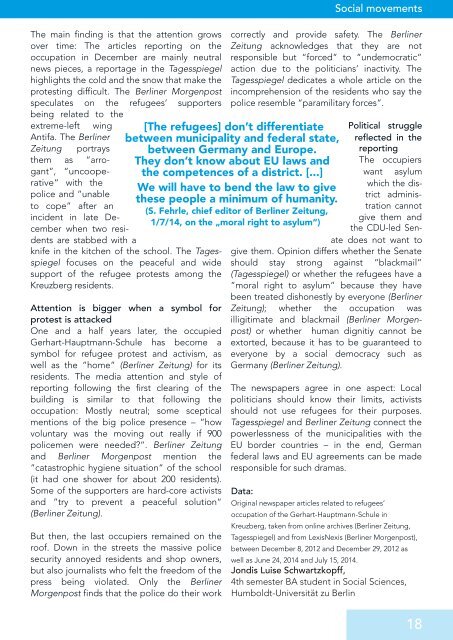Immigration in Berlin
A collection of scientifically-inspired articles written by the students of the course Immigration in Electoral Democracies at the Humboldt - Universität zu Berlin (Summer Semester 2015)
A collection of scientifically-inspired articles written by the students of the course Immigration in Electoral Democracies at the Humboldt - Universität zu Berlin (Summer Semester 2015)
You also want an ePaper? Increase the reach of your titles
YUMPU automatically turns print PDFs into web optimized ePapers that Google loves.
Social movements<br />
The ma<strong>in</strong> f<strong>in</strong>d<strong>in</strong>g is that the attention grows<br />
over time: The articles report<strong>in</strong>g on the<br />
occupation <strong>in</strong> December are ma<strong>in</strong>ly neutral<br />
news pieces, a reportage <strong>in</strong> the Tagesspiegel<br />
highlights the cold and the snow that make the<br />
protest<strong>in</strong>g difficult. The Berl<strong>in</strong>er Morgenpost<br />
speculates on the refugees‘ supporters<br />
be<strong>in</strong>g related to the<br />
correctly and provide safety. The Berl<strong>in</strong>er<br />
Zeitung acknowledges that they are not<br />
responsible but “forced“ to “undemocratic“<br />
action due to the politicians’ <strong>in</strong>activity. The<br />
Tagesspiegel dedicates a whole article on the<br />
<strong>in</strong>comprehension of the residents who say the<br />
police resemble “paramilitary forces“.<br />
extreme-left w<strong>in</strong>g [The refugees] don’t differentiate<br />
Antifa. The Berl<strong>in</strong>er between municipality and federal state,<br />
Zeitung portrays between Germany and Europe.<br />
them as “arrogant“,<br />
“uncoope-<br />
the competences of a district. [...]<br />
They don’t know about EU laws and<br />
rative“ with the<br />
We will have to bend the law to give<br />
police and “unable<br />
these people a m<strong>in</strong>imum of humanity.<br />
to cope“ after an<br />
(S. Fehrle, chief editor of Berl<strong>in</strong>er Zeitung,<br />
<strong>in</strong>cident <strong>in</strong> late De-<br />
1 /7/1 4, on the „moral right to asylum“)<br />
cember when two residents<br />
are stabbed with a<br />
knife <strong>in</strong> the kitchen of the school. The Tagesspiegel<br />
focuses on the peaceful and wide<br />
support of the refugee protests among the<br />
Kreuzberg residents.<br />
Attention is bigger when a symbol for<br />
protest is attacked<br />
One and a half years later, the occupied<br />
Gerhart-Hauptmann-Schule has become a<br />
symbol for refugee protest and activism, as<br />
well as the “home“ (Berl<strong>in</strong>er Zeitung) for its<br />
residents. The media attention and style of<br />
report<strong>in</strong>g follow<strong>in</strong>g the first clear<strong>in</strong>g of the<br />
build<strong>in</strong>g is similar to that follow<strong>in</strong>g the<br />
occupation: Mostly neutral; some sceptical<br />
mentions of the big police presence – “how<br />
voluntary was the mov<strong>in</strong>g out really if 900<br />
policemen were needed?“. Berl<strong>in</strong>er Zeitung<br />
and Berl<strong>in</strong>er Morgenpost mention the<br />
“catastrophic hygiene situation“ of the school<br />
(it had one shower for about 200 residents).<br />
Some of the supporters are hard-core activists<br />
and “try to prevent a peaceful solution“<br />
(Berl<strong>in</strong>er Zeitung).<br />
But then, the last occupiers rema<strong>in</strong>ed on the<br />
roof. Down <strong>in</strong> the streets the massive police<br />
security annoyed residents and shop owners,<br />
but also journalists who felt the freedom of the<br />
press be<strong>in</strong>g violated. Only the Berl<strong>in</strong>er<br />
Morgenpost f<strong>in</strong>ds that the police do their work<br />
Political struggle<br />
reflected <strong>in</strong> the<br />
report<strong>in</strong>g<br />
The occupiers<br />
want asylum<br />
which the dis-<br />
trict adm<strong>in</strong>istration<br />
cannot<br />
give them and<br />
the CDU-led Senate<br />
does not want to<br />
give them. Op<strong>in</strong>ion differs whether the Senate<br />
should stay strong aga<strong>in</strong>st “blackmail“<br />
(Tagesspiegel) or whether the refugees have a<br />
“moral right to asylum“ because they have<br />
been treated dishonestly by everyone (Berl<strong>in</strong>er<br />
Zeitung); whether the occupation was<br />
illigitimate and blackmail (Berl<strong>in</strong>er Morgenpost)<br />
or whether human dignitiy cannot be<br />
extorted, because it has to be guaranteed to<br />
everyone by a social democracy such as<br />
Germany (Berl<strong>in</strong>er Zeitung).<br />
The newspapers agree <strong>in</strong> one aspect: Local<br />
politicians should know their limits, activists<br />
should not use refugees for their purposes.<br />
Tagesspiegel and Berl<strong>in</strong>er Zeitung connect the<br />
powerlessness of the municipalities with the<br />
EU border countries – <strong>in</strong> the end, German<br />
federal laws and EU agreements can be made<br />
responsible for such dramas.<br />
Data:<br />
Orig<strong>in</strong>al newspaper articles related to refugees’<br />
occupation of the Gerhart-Hauptmann-Schule <strong>in</strong><br />
Kreuzberg, taken from onl<strong>in</strong>e archives (Berl<strong>in</strong>er Zeitung,<br />
Tagesspiegel) and from LexisNexis (Berl<strong>in</strong>er Morgenpost),<br />
between December 8, 201 2 and December 29, 201 2 as<br />
well as June 24, 201 4 and July 1 5, 201 4.<br />
Jondis Luise Schwartzkopff,<br />
4th semester BA student <strong>in</strong> Social Sciences,<br />
Humboldt-Universität zu Berl<strong>in</strong><br />
1 8


